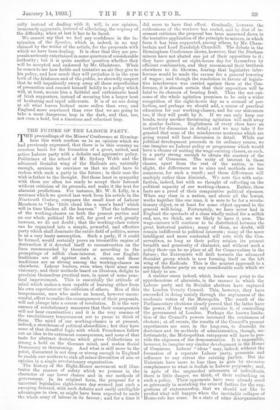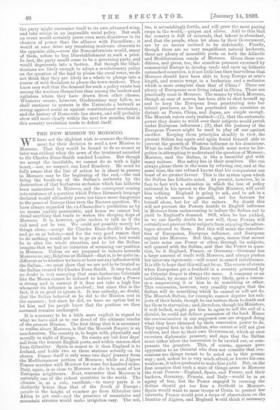THE FUTURE OF THE LABOUR PARTY.
THEproceedings of the Miners' Conference at Birming- ham this week confirm us in an opinion which we had previously expressed, that there is in this country no common basis for the formation of a great, united, and active Labour party with a definite and aggressive policy. Politicians of the school of Mr. Sydney Webb and the advanced Socialist wing of the Radicals are, naturally enough, anxious to convince us that we shall have to reckon with such a party in the future ; in their case the wish is father to the thought. But those least in sympathy with them are often too ready to accept their forecast without criticism of its grounds, and make it the text for alarmist predictions. For instance, Mr. W. S. Lilly, in a sentence which we quoted last week from his article in the Nineteenth Century, compares the small knot of Labour Members to "the little cloud like a man's hand' which will in time blacken all the heavens." That the influence of the working-classes on both the present parties and on our whole political life will, for good or evil, greatly increase, we do not doubt ; that the working-class voters can be organised into a simple, powerful, and effective party which shall dominate the entire field of politics, seems to us a very hasty assumption. Such a party, if it could be formed, would certainly prove an irresistible engine of destruction if it devoted itself to reconstruction on the lines recommended by theorists or according to the promptings of selfish class-interest. But our English traditions are all against such a course, and those traditions are as strong among the working-classes as elsewhere. Labour leaders, even when their aims seem visionary, and their methods based on illusions, delight to proclaim themselves practical men, in quest of some prac- tical improvement. This is essentially the attitude of mind which makes a man capable of learning either from his own experience or the criticism of others. Men of this temperament, men who make an honest, however unsuc- cessful, effort to realise the consequences of their proposals, will not plunge into a course of revolution. It is the very essence of revolutionary measures that their consequences will not bear examination ; and it is the very essence of the revolutionary temperament not to pause to think of them. The mind of our working-classes is at present, indeed, a storehouse of political absurdities ; but they have none of that dreadful logic with which Frenchmen follow out an idea to its extreniest consequences, and. none of that taste for abstract doctrine which gives Collectivism so strong a bold on the German mind, and makes Social Democracy so threatening. And what is still more to the point, discontent is not deep or strong enough in England to enable our workers to sink all minor diversities of aim or opinion in a single revolutionary organisation. The history of the Eight-Hours movement well illus- trates the reserve of safety which we possess in the character of our lower classes and in our methods of government. In its original form, the proposal for a universal legislative eight-hours day seemed just such a sweeping demand, with such definite and easily intelligible advantages in view, as might have been expected to unite the whole army of labour in its favour; and for a time it did seem to have that effect. Gradually, however, the enthusiasm of the workers has cooled, and by dint of in- cessant criticism the proposal has been narrowed down to the tentative application of the principle to miners, in which form it has been supported, among others, by Mr. Cham- berlain and Lord Randolph Churchill, The debate in the Birmingham Conference shows, however, that the Durham miners have not abated one jot of their opposition to it ; they have gained an eight-hours day for themselves by efficient combination, and they recommend their brethren elsewhere to do likewise, fearing that legislative inter- ference would be made the excuse for a general lowering of wages ; and though the resolution in favour of legisla- tive interference was carried against them at the Con- ference, it is almost certain that their opposition will be fatal to its chances of bearing fruit. Thus the net out- come of the whole agitation promises to be only a. wider recognition of the eight-hours day as a counsel of per- fection, and perhaps we should add, a course of practical education for our working-classes, and for our statesmen too, if they will profit by it. If we can only keep our heads, many another threatening agitation will melt away in similar fashion. Englishmen of every class have an instinct for discussion in detail ; and we may take it for granted that none of the mischievous nostrums which are going round will bear discussion in detail. While our political development proceeds in its ordinary course, we can imagine no Labour policy or programme which would have a chance of uniting the wage-earning classes, as such, in a party strong enough to obtain the mastery of the House of Commons. The unity of interest in these classes, apart from the rest of the nation, is too slight, the differences as to aims and methods are too numerous, for such a result ; and these differences will multiply rather than diminish. We note this with satis- faction, indeed, but with no thought of reflecting on the political capacity of our working-classes. Rather, these facts are a proof of their comparative political ripeness. When any class in a nation, and above all the lowest, works together like one man, it is sure to be for a revolu- tionary object, or at least for some object opposed to the general well-being. Fortunately, we have never had in England the spectacle of a class wholly united for a selfish end, nor, we think, are we likely to have it now. The wage-earners will continue to be distributed between the great historical parties ; many of them, no doubt, will remain indifferent to political interests ; many of the more intelligent and more contented will vote with the Con- servatives, so long as their policy retains its present breadth and generosity of character, and without such a policy there can be no place at all for Conservatism in the future ; the Extremists will drift towards the advanced Socialist group which is now forming itself on the left wing of the Radicals. This is the nearest approach to a separate Labour party on any considerable scale which we are likely to see.
A sinister omen indeed, which lends some point to the apprehensions of alarmists, is the manner in which the Labour party and its Socialist abettors have captured the London County Council. This, however, they have succeeded in doing mainly through the supineness of the moderate voters of the Metropolis. The result of the Parliamentary elections clearly proved that the latter have the power, if they would only exercise it, of controlling the government of London. Perhaps the known limita- tion of the Council's powers increased the remissness of electors ; at all events, the results of the Council's present experiments are sure, in the long-run, to discredit its doctrines and its methods of administration, though, un- fortunately, the Metropolitan ratepayers will have to pro- vide the expenses of the demonstration. It is impossible, however, to imagine any similar development in the House of Commons, Labour " ideas " may, indeed, without the formation of a separate Labour party, permeate and influence to any extent the existing parties. But the Unionists have more to lose than to gain by excessive complaisance to what is foolish in Labour proposals; and, in spite of the unguarded utterances of individuals, there is little danger, we think, of their embarking on such a policy. Their opponents have once already erred so grievously in mistaking the cries of faction for the sug- gestions of statesmanship, that we should not like to predict what will happen when the inevitable collapse of Home-rule has come. In a state of utter disorganisation the party might surrender itself to its own advanced wing, and take refuge in an impossible social policy. But such an event would certainly prove even more disastrous to its chances of power than the alliance with Parnellism ; it would at once drive any remaining moderate elements to the opposite side,—even the Nonconformists would, many of them, refuse to buy Disestablishment at such a price. In fact, the party would cease to be a governing party, and would degenerate into a faction. But though the Glad- stonians are likely enough to adopt a revolutionary policy on the question of the land to please the rural voter, we do not think that they are likely as a whole to plunge into a course of wild Socialism to please the town-workers. They know very well that the demand for such a policy exists less among the workers themselves than among the leaders and agitators whom they have drawn from other classes. Whatever course, however, Gladetonians may follow, we shall continue to possess in the Unionists a bulwark as strong against social as against constitutional revolution ; and the history of Home-rule has shown, and will probably show still more clearly within the next few months, that in this country revolution tends to defeat itself.



































 Previous page
Previous page